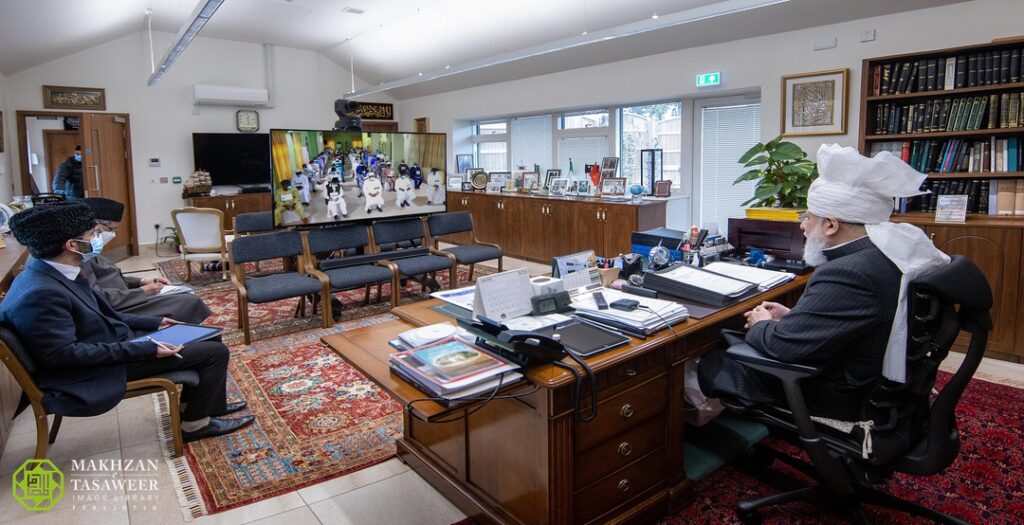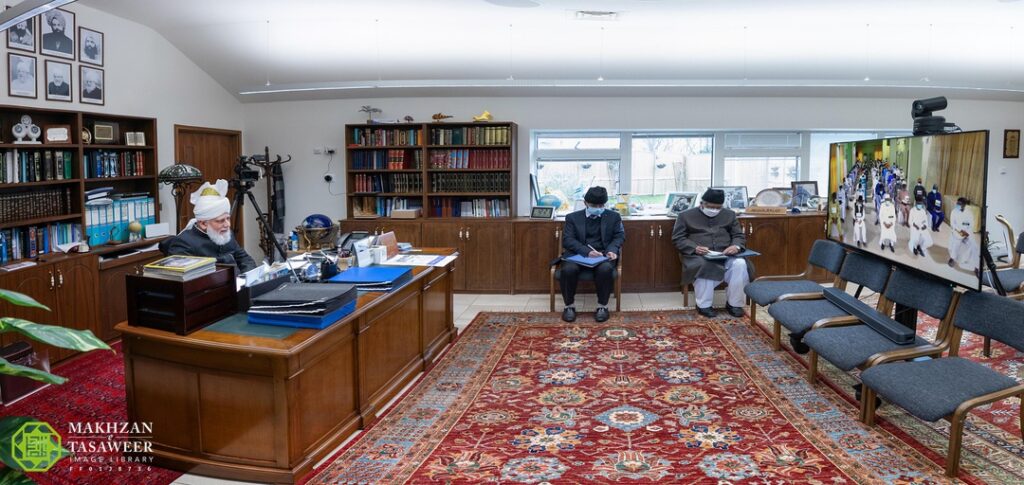On 20 February 2021, members of Nigeria’s national amila were blessed with the opportunity of meeting Hazrat Amirul Momineen, Khalifatul Masih V, may Allah be his Helper, in a virtual mulaqat.
During the mulaqat, various doctors and missionaries serving in the country were also present.

Amila members were gathered in the Lajna Hall in Lagos, Nigeria’s capital. After conveying his salaam, Hazrat Khalifatul Masihaa led everyone in dua, after which the amila members had the opportunity to introduce themselves, their roles and the work assigned to them. Throughout, Huzooraa provided ample guidance and direction.
Addressing the naib amir finance and administration, Huzooraa asked how frequently he held finance committee meetings, to which he replied that such meetings were conducted every month. Hearing this, Hazrat Amirul Momineenaa said, “Masha-Allah!”
Following this, secretary talim was asked by Hazrat Amirul Momineenaa as to how many students were currently studying in universities, to which he responded by saying that there were 855 students. Huzooraa then enquired about the details of such students.
Whilst offering guidance, Hazrat Amirul Momineenaa said:
“You should form a counselling and guidance committee. The purpose of the committee will be to guide and counsel the students who are secondary school going students and guide them regarding the further education they can have according to the local conditions and local requirements. And try to encourage your students to go into the public service, right from the lower level to the highest level. In each and every department, there should be Ahmadis.
“Make a plan and give this plan to the students so that they can have better job opportunities. Then they should get well prepared for the exam. To enter into the public service, you have to pass an examination and until and unless you are of a high-calibre and good standard, you cannot qualify for this examination. So, you should try to encourage your students to go into the public service.”
Subsequently, whilst addressing secretary tarbiyat, Hazrat Khalifatul Masihaa said:
“There should be some comprehensive tarbiyat plan so that those who are born Ahmadis can also benefit from it and those who are entering the Jamaat, new converts, after three years, should also follow that plan. Each and every Ahmadi should be very particular and punctual in offering the five daily prayers, should be very particular in tilawat [recitation] of the Holy Quran, should be very punctual and regular and particular in reading some books of hadith or at least the books of the Promised Messiah, peace be upon him, which cover hadith and the Quran and so many things.
“In this way, you should prescribe some books also for the Jamaat members so that they can read those books which have been translated into English and so that they know the purpose of the Promised Messiahas, what he said, what he expected of us and how an Ahmadi should behave. All this is the job of the tarbiyat department. You should make a plan in this way.”
Hazrat Khalifatul Masihaa added:
“If the tarbiyat department is active and you have done your job appropriately and in the best way, and in the best manner, then quite a number of other departments will run smoothly.”
Following this, whilst addressing sadr Ansarullah Nigeria, Hazrat Amirul Momineenaa asked him how old he was; to this, he responded by saying he was 65. Upon this, Huzooraa said, “Masha-Allah! You look quite young.” Huzooraa then addressed both sadr Ansarullah and sadr Khuddam-ul-Ahmadiyya and told them that their tajnid should be updated.
Huzooraa said, “Until and unless your tajnid is not up to the mark, you cannot properly do tarbiyat and training of your Khuddam-ul-Ahmadiyya. You have to work hard.”
Hazrat Khalifatul Masihaa then asked the general secretary how many jamaats were in Nigeria and how many would regularly send their reports. Huzooraa also asked how many of the jamaats were active and what was being done to ensure the other jamaats also became active. Huzooraa then asked how many jamaats had local missionaries or regional missionaries appointed.
Hazrat Amirul Momineenaa then offered guidance and said:
“Where you have more than 100 Ahmadis, or at least 100 Ahmadis, there should be a local missionary there.” Huzooraa added, “In each and every jamaat, you should appoint one missionary. It should not be that a missionary oversees the work of other two or three Jamaats … Put this matter before the amila and then [present this matter] before the Shura.”
Whilst addressing secretary tabligh, Hazrat Khalifatul Masihaa said, “[This is a] very big task; a very important assignment has been given to you” and further asked about the tabligh plan. The secretary replied that they would hold one-on-one engagements with others, public gatherings, lectures and include scholars in their tabligh efforts.
Addressing secretary Waqf-e-Nau, Huzooraa asked how many Waqf-e-Nau there were in Nigeria and if they had the data of their age groups. The secretary replied that there was a total of 610 waqifeen-e-nau in Nigeria and over 200 that were above the age of 15. Huzooraa then asked if they were provided any guidance and counselling and if the syllabus was being followed properly. Hazrat Khalifatul Masihaa then said that they should be encouraged to join fields such as Jamia and medicine.
Whilst addressing the secretary for agriculture, Hazrat Amirul Momineenaa, upon hearing that out of 500 acres of land, only 16 acres was under cultivation, encouraged him to start a big project. Huzooraa added, “I know the environment, I have lived in this region for many years. I know how to clear the bush and how to do the planting. So, it only needs hard work and if you are determined to do it, you can do it.”
Subsequently, addressing the secretary umur-e-kharija, Hazrat Khalifatul Masihaa asked if they had made contact with politicians and other officials, to which he responded in the affirmative. Huzooraa said, “Make proper use of these contacts.”

Whilst addressing secretary for hospitality, Hazrat Khalifatul Masihaa asked what food had been prepared for the amila members. When Huzooraa was told that they had prepared fried rice, jollof rice with some local food, he replied, “Masha-Allah! Very sumptuous.”
Whilst conversing with secretary Waqf-e-Jadid and hearing the targets they had set for the year, Huzooraa said, “Masha-Allah! Allah bless this. You should try and achieve this target.”
Then, whilst conversing with secretary publications, Huzooraa asked if any magazine or bulletin was prepared for the Jamaat. Upon this, the secretary responded in the affirmative and said that a quarterly magazine was prepared.
Hazrat Amirul Momineenaa addressed the secretary umur-e-ama and asked if he knew how many Jamaat members were unemployed and what measures were being taken to help them find employment and if they were being guided in this matter. The secretary replied in the affirmative and said that they were helping and guiding many.
Hazrat Khalifatul Masihaa said to secretary talim-ul-Quran and waqf-e-arzi that each amila member should do waqf-e-arzi for two weeks. Further, Huzooraa asked about the plan that was being made for talim-ul-Quran lessons, to which he was told that they had various classes to help teach the Holy Quran. Hearing this, Huzooraa said, “Try to include more new converts into these classes.”
Addressing a missionary who attained his Shahid degree from Jamia International Ghana, Huzooraa asked how many years he had been serving and further asked if he read the books of the Promised Messiahas regularly. The missionary responded by saying that he had been serving for four years and that he studied two pages from the books of the Promised Messiahas daily. Hearing this, Huzooraa said, “Yes, every missionary should at least study two pages daily.” Huzooraa added, “One should also recite the Holy Quran early in the morning and ponder over it.”
Addressing another missionary who studied in Jamia International, Hazrat Amirul Momineenaa asked when he had passed Jamia. Responding in Urdu, the missionary said, “Do hazar satrah mein [In 2017].” Hearing the missionary’s pronunciation of “satrah” (17), Huzooraa said, “Your Urdu is good, Maulvi Sahib. Masha-Allah! Even many people familiar with Urdu are unable to pronounce the number ‘satrah’ and usually say ‘sataarah’.”
As the mulaqat came to a close, Hazrat Khalifatul Masihaa addressed the amir and said, “We have already prayed. Allah Almighty bless you … As I have already directed and guided some of the secretaries, they should work hard now according to my instructions and you should also see where you are lagging behind so that you can improve.”
Upon this, Huzooraa conveyed his salaam to them and to all of the amila members.
(Report prepared by Al Hakam)

